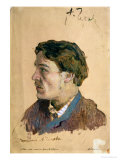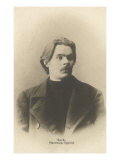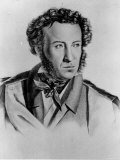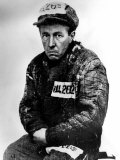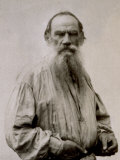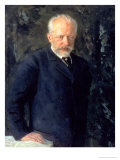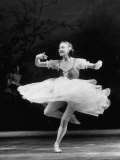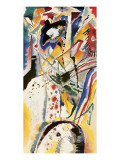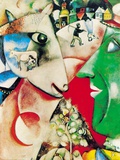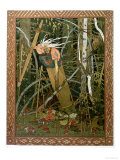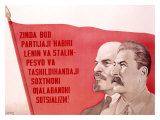|
|
|
|
|
|
Anton Chekhov
b. 1-29-1850; Taganrog, Russia
d. 7-2-1904; Badenweiler, German Empire (tuberculosis)
Russian playwright and short story writer Anton Chekhov, best remembered for his plays The Seagull, Uncle Vanya, Three Sisters, and The Cherry Orchard, was also a medical doctor.
• The Portable Chekhov, Anton Chekhov
Chekhov quotes ~
• “Medicine is my lawful wife, and literature is my mistress.”
• “There is nothing new in art except talent.”
• “We learn about life not from plusses alone, but from minuses as well.”
• “The thirst for powerful sensations takes the upper hand both over fear and over compassion for the grief of others.”
• authors, poets, novelist posters
|
|
|
|
Nikolai Vasilievich Gogol
b. 4-1-1809; Sorochyntsi, Russian Empire (now Ukraine)
d. 3-4-1852
Nikolai Gogol, considered the father of modern Russian realism was exiled for satirizing the corrupt bureaucracy of the Russian Empire.
Among his best known works are the novels Taras Bul'ba and Dead Souls, the play The Inspector-General, and the short stories Diary of a Madman, The Nose and The Overcoat.
• The Collected Tales of Nikolai Gogol
|
|
|
|
Maxim Gorky
née Alexei Maximovich Peshkov
b. 3-28-1868; Nizhny Novgorod, Russian Empire
d. 6-14-1936; near Moscow
Author Maxim Gorky was a founder of the socialist realism literary method, and a political activist. Gorky was known to write incessantly and viewing “literature less as an aesthetic practice (though he worked hard on style and form) than as a moral and political act that could change the world”.
He was influenced by the Russian writer Nikolay Chernyshevsky.
Maxim Gorky quotes ~
• “When one loves somebody everything is clear - where to go, what to do - it all takes care of itself and one doesn't have to ask anybody about anything.”
• “Only mothers can think of the future-because they give birth to it in their children.”
• “Everybody, my friend, everybody lives for something better to come. That's why we want to be considerate of every man – Who knows what's in him, why he was born and what he can do?”
• “When everything is easy one quickly gets stupid.”
• Autobiography of Maxim Gorky
|
|
|
|
Aleksandr Sergeevich Pushkin
b. 6-6-1799; Moscow
d. 2-10-1837; St. Petersburg
Aleksandr Sergeevich Pushkin, a Russian author of the Romantic era, is considered by many to be the greatest Russian poet. He pioneered the use of vernacular speech in his work, creating a style of storytelling that mixes drama, romance, and satire that was compatible with his radical social reform that got him exiled to southern Russia in the 1820s.
• Collected Narrative and Lyrical Poetry by Aleksandr Sergeevich Pushkin
|
|
|
|
Alexander Solzhenitsyn
b. 12-11-1918; Kislovodsk, Russia
d. 8-3-2008; Moscow
Alexander Solzhenitsyn, author and historian, made the world aware of the Soviet Gulag labor camp system with his ”The Gulag Archipelago”, a multi part narrative based on personal experience, eyewitness testimony and primary research material. Solzhenitsyn was exiled from the Soviet Union for nearly twenty years, returning in 1994. Solzhenitsyn was awarded the 1970 Nobel Prize in Literature “for the ethical force with which he has pursued the indispensable traditions of Russian literature.”
Alexander Solzhenitsyn quotes ~
• “The one and only substitute for experience which we have not ourselves had is art, literature.”
• “Justice is conscience, not a personal conscience but the conscience of the whole of humanity. Those who clearly recognize the voice of their own conscience usually recognize also the voice of justice.”
• “Even the most rational approach to ethics is defenseless if there isn't the will to do what is right.”
• “Own only what you can always carry with you: know languages, know countries, know people. Let your memory be your travel bag.”
• “The Universe has as many different centers as there are living beings in it.”
• “It is time in the West to defend not so much human rights as human obligations.”
|
|
|
|
Leo Tolstoy
b. 9-9-1828; Yasnaya Polyana, Russian Empire
d. 11-20-1910; Astapovo
Leo Tolstoy, best remembered as the author of War and Peace and Anna Karenina, was also an educational reformer, founding schools for the serfs on the family estate.
Tolstoy was also a “teacher” of Gandhi who called Tolstoy “the greatest apostle of non-violence that the present age has produced”.
|
|
Leo Tolstoy quotes ~
• “School is established, not in order that it should be convenient for the children to study, but that teachers should be able to teach in comfort. The children’s conversations, motion, merriment are not convenient for the teacher, and so in the schools, which are built on the plan of prisons, ... are prohibited.”
• “Everyone thinks of changing the world, but no one thinks of changing himself.”
• “All, everything that I understand, I understand only because I love.”
• “A man can live and be healthy without killing animals for food; therefore, if he eats meat, he participates in taking animal life merely for the sake of his appetite.”
• “Art is not a handicraft, it is the transmission of feeling the artist has experienced.”
• Great Short Works of Leo Tolstoy
• The Last Station
|
|
|
|
Piotr Ilyich Tchaikovsky
b. 4-25-1840; Kamsko-Votkinsk, Russia
d. 11-6-1893; St. Petersburg
Tchaikovsky was a composer of ballets, operas, symphonies, and concertos of the Romantic era. His music is known and loved for its Russian character expressed in folk melodies, effective use of international elements and rich harmonies. Tchaikovsky's cause of death is generally accepted to be suicide.
• more Tchaikovsky posters
|
|
|
|
Galina Ulanova
b. 1-7-1910; St. Petersburg, Russia
d. 3-21-1998
Ulanova was prima ballerina assoluta of the Soviet Union for 16 years.
|
|
|
|
Anna Pavlova
b. 1-31-1881; St. Petersburg
d. 1-23-1931; The Netherlands
Anna Pavlova became known for her delicate etheral look that contrasted with the then predominant Russian ideal of strong and muscular dancers. Also because of her highly arched foot Pavlova developed a pointe shoe that served as the model for today's pointe shoe. Her showpiece “The Dying Swan” is danced to Camille Saint-Saëns' “The Swan” from Carnival of the Animals.
• more dancers list
|
|
|
|
Catherine the Great
b. 5-2-1729; Poland
d. 11-7-1796; suffered a stroke
Catherine II of Russia is better known as Catherine the Great: she ruled Russia for 34 years and epitomizes the description "enlightened despot".
Catherine II was born Sophie Friederike Auguste von Anhalt-Zerbst in Poland to minor nobility. When she became wife to the prospective tsar — Peter of Holstein-Gottorp, and despite the intrigues of her social climbing mother, she had made up her mind “to do whatever seemed necessary, and to profess to believe whatever required of her”, in order to become qualified to wear the crown. When her husband was deposed, she was proclaimed Empress.
• women rulers posters
|
|
|
|
Wassily Kandinsky
b. 12-4-1866; Moscow, Russia
d. 12-13-1944; France
Wassily Kandinsky, the father of abstract art, was also a skilled musician who saw color when he listened to music, and believed color could visually express music’s timber, pitch and volume. Trained in the legal profession, Kandinsky began his art studies at age 30 after seeing Monet’s “Haystacks”.
Kandinsky was a founding member of Der Blaue Reiter group.
• more 20th C. Art Masterpieces
• Concerning the Spiritual in Art by Wassily Kandinsky
Kandinsky quotes ~
• “I value those artists who embody the expression their life.”
• “Almost without exception, blue refers to the domain of abstraction and immateriality.”
• “In the hierarchy of colors, green represents the social middle class, self-satisfied, immovable, narrow... ”
• “A parallel between color and music can only be relative – just as a violin can give warm shades of tone, so yellow has shades, which can be expressed by various instruments.”
• “When I was thirteen or fourteen I bought a paintbox with oil paints from money slowly saved up. The feeling I had at the time – or better – the experience of color coming slowly out of the tube – is with me to this day.”
• “In place of an intensive cooperation among artists, there is a battle for goods. Hatred, partisanship, cliques, jealousy, and intrigues are the natural consequences of an aimless, materialist art.”
• “All methods are sacred if they are internally necessary. All methods are sins if they are not justified by internal necessity.”
• “Every man who steeps himself in the spiritual possibilities of his heart is a valuable helper in the building of the spiritual pyramid which will someday reach to heaven.”
• “Every work of art is the child of its time; each period produces an art of its own, which cannot be repeated.”
|
|
|
|
Marc Chagall
née Moishe Shagal
b. 7-6-1887; Liozna, near Vitebsk, Belorussia
d. 3-28-1985; Saint-Paul, France
Marc Chagall embraced the philosophy that love colored his paintings. Focusing extensively on his childhood, his happy, optimistic paintings defy the poverty of his upbringing in a Russian Shtetl.
After a brief time in Paris, Chagall escaped to the US during World War II where his career reached new heights including a rare exhibit during his lifetime at the Louvre.
• Art History posters
|
|
|
|
The Witch Baba Yaga, the Story of ‘Vassilissa the Beautiful’
Baba Yaga is the wild old woman (Baba means grandmother), mistress of magic and a forest spirit. She flies about in a mortar, steering with a pestle - the imagary of putting together magic potions, and her house is built on chicken legs.
Bilibin was an influential 20th-century Russian illustrator who was strongly inspired by Slavic folklore. He died during the siege of Leningrad in WWII.
• more folk tale, children's literature posters
|
|
|
|
|
|
|
|
I have searched the web for visual, text, and manipulative curriculum support materials - teaching posters, art prints, maps, charts, calendars, books and educational toys featuring famous people, places and events - to help teachers optimize their valuable time and budget.
Browsing the subject areas at NetPosterWorks.com is a learning experience where educators can plan context rich environments while comparing prices, special discounts, framing options and shipping from educational resources.
Thank you for starting your search for inspirational, motivational, and educational posters and learning materials at NetPosterWorks.com. If you need help please contact us.
|
|
|











